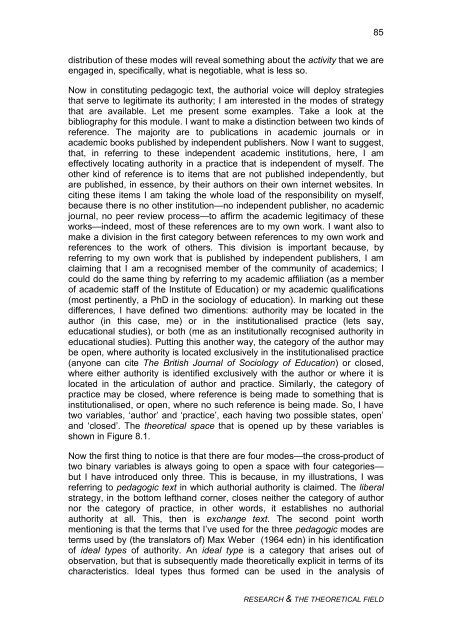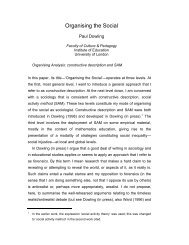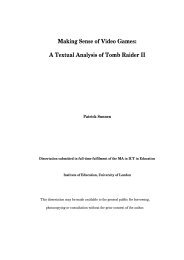Research and the Theoretical Field - Pauldowling.me
Research and the Theoretical Field - Pauldowling.me
Research and the Theoretical Field - Pauldowling.me
Create successful ePaper yourself
Turn your PDF publications into a flip-book with our unique Google optimized e-Paper software.
85<br />
distribution of <strong>the</strong>se modes will reveal so<strong>me</strong>thing about <strong>the</strong> activity that we are<br />
engaged in, specifically, what is negotiable, what is less so.<br />
Now in constituting pedagogic text, <strong>the</strong> authorial voice will deploy strategies<br />
that serve to legitimate its authority; I am interested in <strong>the</strong> modes of strategy<br />
that are available. Let <strong>me</strong> present so<strong>me</strong> examples. Take a look at <strong>the</strong><br />
bibliography for this module. I want to make a distinction between two kinds of<br />
reference. The majority are to publications in academic journals or in<br />
academic books published by independent publishers. Now I want to suggest,<br />
that, in referring to <strong>the</strong>se independent academic institutions, here, I am<br />
effectively locating authority in a practice that is independent of myself. The<br />
o<strong>the</strong>r kind of reference is to items that are not published independently, but<br />
are published, in essence, by <strong>the</strong>ir authors on <strong>the</strong>ir own internet websites. In<br />
citing <strong>the</strong>se items I am taking <strong>the</strong> whole load of <strong>the</strong> responsibility on myself,<br />
because <strong>the</strong>re is no o<strong>the</strong>r institution—no independent publisher, no academic<br />
journal, no peer review process—to affirm <strong>the</strong> academic legitimacy of <strong>the</strong>se<br />
works—indeed, most of <strong>the</strong>se references are to my own work. I want also to<br />
make a division in <strong>the</strong> first category between references to my own work <strong>and</strong><br />
references to <strong>the</strong> work of o<strong>the</strong>rs. This division is important because, by<br />
referring to my own work that is published by independent publishers, I am<br />
claiming that I am a recognised <strong>me</strong>mber of <strong>the</strong> community of academics; I<br />
could do <strong>the</strong> sa<strong>me</strong> thing by referring to my academic affiliation (as a <strong>me</strong>mber<br />
of academic staff of <strong>the</strong> Institute of Education) or my academic qualifications<br />
(most pertinently, a PhD in <strong>the</strong> sociology of education). In marking out <strong>the</strong>se<br />
differences, I have defined two di<strong>me</strong>ntions: authority may be located in <strong>the</strong><br />
author (in this case, <strong>me</strong>) or in <strong>the</strong> institutionalised practice (lets say,<br />
educational studies), or both (<strong>me</strong> as an institutionally recognised authority in<br />
educational studies). Putting this ano<strong>the</strong>r way, <strong>the</strong> category of <strong>the</strong> author may<br />
be open, where authority is located exclusively in <strong>the</strong> institutionalised practice<br />
(anyone can cite The British Journal of Sociology of Education) or closed,<br />
where ei<strong>the</strong>r authority is identified exclusively with <strong>the</strong> author or where it is<br />
located in <strong>the</strong> articulation of author <strong>and</strong> practice. Similarly, <strong>the</strong> category of<br />
practice may be closed, where reference is being made to so<strong>me</strong>thing that is<br />
institutionalised, or open, where no such reference is being made. So, I have<br />
two variables, ‘author’ <strong>and</strong> ‘practice’, each having two possible states, open’<br />
<strong>and</strong> ‘closed’. The <strong>the</strong>oretical space that is opened up by <strong>the</strong>se variables is<br />
shown in Figure 8.1.<br />
Now <strong>the</strong> first thing to notice is that <strong>the</strong>re are four modes—<strong>the</strong> cross-product of<br />
two binary variables is always going to open a space with four categories—<br />
but I have introduced only three. This is because, in my illustrations, I was<br />
referring to pedagogic text in which authorial authority is clai<strong>me</strong>d. The liberal<br />
strategy, in <strong>the</strong> bottom lefth<strong>and</strong> corner, closes nei<strong>the</strong>r <strong>the</strong> category of author<br />
nor <strong>the</strong> category of practice, in o<strong>the</strong>r words, it establishes no authorial<br />
authority at all. This, <strong>the</strong>n is exchange text. The second point worth<br />
<strong>me</strong>ntioning is that <strong>the</strong> terms that I’ve used for <strong>the</strong> three pedagogic modes are<br />
terms used by (<strong>the</strong> translators of) Max Weber (1964 edn) in his identification<br />
of ideal types of authority. An ideal type is a category that arises out of<br />
observation, but that is subsequently made <strong>the</strong>oretically explicit in terms of its<br />
characteristics. Ideal types thus for<strong>me</strong>d can be used in <strong>the</strong> analysis of<br />
RESEARCH & THE THEORETICAL FIELD




